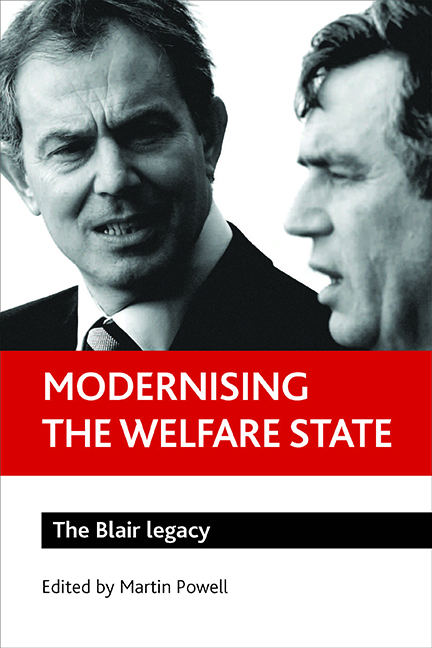Book contents
- Frontmatter
- Contents
- List of tables and figures
- Acknowledgements
- Notes on contributors
- one Introduction: modernising the welfare state
- two The NHS after 10 years of New Labour
- three Housing policy: coming in out of the cold?
- four Social security and welfare reform
- five Social care under Blair: are social care services more modern?
- six Education: from the comprehensive to the individual
- seven Controlling crime and disorder: the Labour legacy
- eight Social investment: the discourse and the dimensions of change
- nine Risk and the Blair legacy
- ten Going private?
- eleven Choice in public services: ‘no choice but to choose!’
- twelve The conditional welfare state
- thirteen The stages of New Labour
- fourteen Social Democratic reforms of the welfare state: Germany and the UK compared
- fifteen Conclusion: the Blair legacy
- Index
- Also available from The Policy Press
twelve - The conditional welfare state
Published online by Cambridge University Press: 21 January 2022
- Frontmatter
- Contents
- List of tables and figures
- Acknowledgements
- Notes on contributors
- one Introduction: modernising the welfare state
- two The NHS after 10 years of New Labour
- three Housing policy: coming in out of the cold?
- four Social security and welfare reform
- five Social care under Blair: are social care services more modern?
- six Education: from the comprehensive to the individual
- seven Controlling crime and disorder: the Labour legacy
- eight Social investment: the discourse and the dimensions of change
- nine Risk and the Blair legacy
- ten Going private?
- eleven Choice in public services: ‘no choice but to choose!’
- twelve The conditional welfare state
- thirteen The stages of New Labour
- fourteen Social Democratic reforms of the welfare state: Germany and the UK compared
- fifteen Conclusion: the Blair legacy
- Index
- Also available from The Policy Press
Summary
Introduction
This chapter utilises the work of Hall (1993) and 6 and Peck (2004) (see Chapter One, this volume) to explore welfare conditionality under New Labour. Hall's (1993) discussion of policy learning and paradigm shift is useful for analysing the wider importance of the conditional welfare state that has been mapped out by the Blair administrations. Certainly, his discussion of three key policy variables (that is, goals, instruments and settings) provides a useful way for considering the wider significance and long-term impact of New Labour's welfare reforms. Likewise, consideration of 6 and Peck's (2004) work highlights that several elements of New Labour's ‘modernisation’ agenda are also relevant here.
The concept of a welfare claim requiring some form of prior recognisable contribution became increasingly significant under the Blair governments of 1997–2007 and the much-quoted mantra that ‘rights come with responsibilities’ has long been a distinctive feature of New Labour's welfare reform. Increasingly, a principle of conditionality (Deacon, 1994), which holds that eligibility to certain basic, publicly provided welfare entitlements should be dependent on an individual citizen meeting particular compulsory duties or patterns of behaviour, has assumed central importance. As early as 1993, while in opposition, Blair was emphatically stating that a ‘modern notion of citizenship gives rights but demands obligations, shows respect but wants it back, grants opportunity but insists on responsibility’ (Blair, 1996, p 218), and a concern with duty rather than rights was clearly central in Blair's thinking when setting the tone for future governments. ‘Duty is the cornerstone of a decent society. It defines the context in which rights are given…. The rights we receive should reflect the duties we owe’ (Blair, 1995, p 5). Similarly, New Labour's first major statement of welfare policy intent, the welfare reform Green Paper (DSS, 1998), was couched directly in terms of modernising the welfare contract between the individual citizen and the state, and much subsequent policy has been concerned to set out details of ‘the responsibilities that must be accepted in return for social rights’ (Buck et al, 2006, p 1).
The notion that a citizen's right to social welfare should be linked to personal responsibility has a long heritage and did not, of course, begin with the ascent of New Labour.
- Type
- Chapter
- Information
- Modernising the Welfare StateThe Blair Legacy, pp. 199 - 218Publisher: Bristol University PressPrint publication year: 2008



